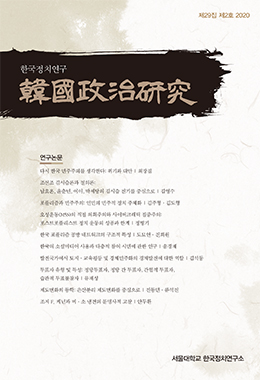이 글은 이탈리아 오성운동의 특징을 최소 정의에 따른 포퓰리즘의 속성과 포스트포퓰리즘의 성격을 통해 밝혔다. 이 글에서 포퓰리즘은 인민과 엘리트의 적대 구도라는 사회관과 인민 의사의 최대한 직접 반영이라는 정치관을 핵심 속성으로 하는 이념이며, 포스트포퓰리즘은 구포퓰리즘과 달리 대의 정치를 수용할 뿐 아니라 신포퓰리즘과도 달리 개인주의를 수용하는 새로운 포퓰리즘이다. 오성운동은 이탈리아 사회를 엘리트(카스트)와 인민(보통 사람들)의 적대 구도로 보고 인터넷 민주주의를 통해 인민을 직접 대변하려 한다는 점에서 포퓰리즘의 최소 정의에 충실하다. 또한 당원과 인민들의 다원성과 개별성을 인정하며 인민의 의사를 웹 기반 직접 의회주의를 통해 실현하려 한다는 점에서 포스트포퓰리즘에 근접했다. 그러나 카리스마적 지도자와 그에 기반한 사이버크래틱 집중주의에 의존한다는 한계를 가졌다.
This paper analyzed the characteristics of the Italian Five Star Movement (M5S) with a minimalist definition of populism and attributes of post-populism. In this article, populism is defined as the idea that sees society as a confrontation between two opposing camps, the people and the elite, and that the politics should reflect people’s opinions as directly as possible, and post-populism as a new populism that accepts not only the representative politics (unlike paleo-populism) but also individualism (unlike neo-populism). The M5S meets the requirements of minimalist definition in that it views the Italian society as the antagonism between the people and the elite, i.e. the ordinary people and the caste, and tries to directly represent the people through Internet democracy. It is also (close to) a post-populist in that it recognizes the plurality and individuality of the party members and the people and tries to realize their will through web-based direct parliamentarianism. However, it has limitations in that it relies on charismatic leadership and cybercratic centralism.


